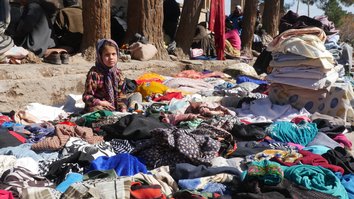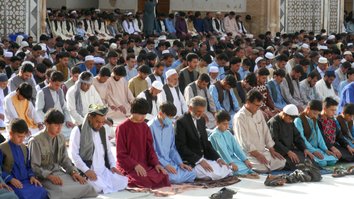HERAT -- This year, Eid ul Adha has arrived as many Afghans suffer from poverty, unemployment and hunger.
Most cannot afford to buy new clothes, dried fruit, or an animal to sacrifice (qurbani) for the major religious celebration, which starts Tuesday (June 27) in Afghanistan.
Mohammad Rasoul, 45, is a labourer in Herat city and the breadwinner of a family of five.
Rasoul, who is unemployed, has not bought clothes for himself or his children. He cannot afford Eid shopping or qurbani either, he said.
![A market stall owner waits for customers on June 26 in Herat city. [Omar/Salaam Times]](/cnmi_st/images/2023/06/27/42753-e_2-585_329.jpg)
A market stall owner waits for customers on June 26 in Herat city. [Omar/Salaam Times]
"I cannot buy clothes and nuts for my family if I don't have work and an income."
"I am broke rather than happy, so the arrival of Eid has saddened me," he said.
"Despite waiting for work every day on the side of a road, I can't find anything. All I have is 500 AFN ($5.80) -- how could I celebrate Eid with that little money?"
"If I had money, I would buy clothes and dried fruit for my kids as well as a sheep for qurbani," he said.
Mirza Jafari, 58, a resident of Herat city, is the breadwinner of a family of eight who came to the market to buy dried fruit on Monday.
"In the past, I would buy new clothes for my wife and children and enough dried fruit to celebrate Eid, but this year, because of economic problems, I could not buy new clothes for every member of my family," he said.
"I will just buy enough dried fruit for my relatives and neighbours to eat when they visit us during the Eid celebrations so that I won't feel embarrassed. In the past, I would buy 2kg or more of each kind of dried fruit, but this year, I can only afford to buy 1kg or less of each," he added.
Until a year ago, Jafari was working at a hotel, but the hotel management had to lay off a number of workers, including him.
He is now working with his brother in a mechanic shop and makes 5,000 AFN ($58) a month, which meets only the basic needs of his life, he said.
Purchasing power declining
With the arrival of Eid, over 200 pop-up shops selling nuts, dried fruit and sweets have appeared on one side of a 64-metre-long road in northern Herat.
The shopkeepers complain that compared to previous years, fewer customers come to the market to buy treats for Eid.
Sayed Wali Haqmal, 24, a shopkeeper in Herat city, says he had many customers until August 2021, but the number of his customers has decreased in the past two years.
"In the past, I had so many customers that I could not tend to all of them, but this year I've been waiting for hours for one customer to come and buy dried fruit for Eid."
"The situation this year is not comparable to two years ago," he said.
"Some people come, check the prices and leave, because they cannot afford anything. Sometimes I end up offering the fruit at the price I bought them, but [they] still won't make a purchase."
Despite the arrival of Eid, he has had no sales and will have to sell the dried fruit at a loss, Haqmal said.
Omid Alizada, 28, a shopkeeper in Herat city, echoed Haqmal's complaints.
"Customers only check the prices and leave. Prices have gone up, and [they]have lost their source of income. Compared to two years ago, the economy has deteriorated so much that they cannot afford Eid shopping," he said.
"In the past, some shoppers would buy 15 to 20kg of dried fruit for Eid, but now they can afford to buy only up to 3kg," he added.
"Labourers and low income individuals would also spend up to 5,000 AFN ($58) on dried fruit every Eid, but now only a few can spend even 1,000 to 2,000 AFN ($12–23)."
Customers were happy in the past and had incomes, but they have lost their spirits now and do not shop, as they are poor and destitute, Alizada said.
Disappointment, despair
Unlike previous years, Faisal Sarwari, a student at Herat University, has not bought new clothes or prepared for Eid.
He is very disappointed by the current situation as he cannot celebrate Eid like he did in years past, he said, adding that most of his classmates and friends have left the country.
"Studying at the university is not as appealing as it used to be, either. I attend classes only so that I'm not marked absent, but I'm constantly stressed out about where I could work after graduating," he added.
"Every time I walk in the city, I see hundreds of impoverished women, men and children begging as they have nothing to eat."
"This situation is very painful for me and has made me completely lose hope for the future."
The thought of wearing new clothes on Eid while millions of his fellow Afghans cannot celebrate the occasion amid poverty is not pleasant to him, Sarwari said.
Shir Aqa, 58, who has a family of five, owns a handcart and earns a living by carrying goods for his clients from one part of Herat city to another.
In the past, he used to make up to 500 AFN ($5.80) a day, but work has slowed down in the past year amid economic woes in society. Now, he is making 50 to 100 AFN (59 US cents to $1.18) a day, he said.
"Eid is joyful for those who have money and can afford to buy clothes and sweets, but I have no money for Eid shopping."
"I spend entire days on the streets, but there is no work, and the income I have doesn't even cover dry bread for my family," he added.
Most Afghans who suffer from poverty like him do not really celebrate Eid, Aqa said.








This year's Eid in Afghanistan was really a Eid which had no pleasure at all. Millions of Afghans are unemployed and live below the poverty line. How can a person who does not earn even AFN 5,000 a month celebrate Eid and how can they be happy when Eid comes? I am one of those Afghans who neither bought nor ate dry fruit during Eid in these two years, because there is no work opportunity. No one is easily employed in the government. International organizations hire those who have recommendations, so in such cases, Eid will definitely be dull and boring.
Reply5 Comment
There is no work in Kabul during the 4 months of winter. Most people have a lot of trouble finding dry bread for their families. This year, with the end of winter, Eid ul-Fitr arrived, and majority of the people could not afford to buy dry fruits or clothes, because there is no work in most provinces of Afghanistan in the winter, and when Eid ul-Adha arrived, people can't afford dry bread. The economic situation of the people is worse than last year. There is an abundance of items in the cities of Afghanistan, the prices are also low, but most of the poor people of Afghanistan cannot afford to buy fresh or dried fruits. Those who work in Afghanistan face a lot of problems in providing bread for their families. In Afghanistan, life is better for the people who have one or two sons working outside of Afghanistan, and provide money for their family every month. The life of the same people is good, but from the economic point of view, a large number of Afghan people live in foreign countries. These Afghan people along with their families in Afghanistan provide financial assistance every month. If these contributions were not made, there would not be many people in Afghanistan to eat bread. We request foreign countries to recognize the government of Afghanistan so that the people of Afghanistan do not face more economic problems.
Reply5 Comment
The people of Afghanistan are facing a severe economic crisis. Afghanistan used to rely on foreign aid, but the difference is that foreign aid is now reduced. The world has already given aid to Afghanistan, but it has decreased with the arrival of a new system. This is what has hurt Afghanistan's economy. Previously, many Afghans worked with foreign organizations with high salaries, but with the new regime, many organizations either left or reduced their work. It is also important to reduce the number of employees. The activities of foreign organizations in Afghanistan were something that helped to employ people almost as much as the government and provided employment opportunities to people which had higher salaries than that of the government employees. Now this is not the other way around. Many organizations have left the country and professional people have also left the country. Nearly four hundred thousand or more people have escaped from Afghanistan. This process is still going on and young people are trying to leave the country legally. They were the ones who worked for high wages that were sent back to the Afghan market. Now there is no institution, no help and no salary.
Reply5 Comment
Afghans are facing a severe economic crisis. Afghanistan used to rely on foreign aid, but the difference is that now foreign aid has decreased compared to what existed before. The international community used to give a lot of aid to Afghanistan, but with the arrival of the new system, their aid has decreased. These are all things that have harmed the Afghan economy. Previously, many Afghans used to work with foreign organizations for high salaries, but with the arrival of the new system, many organizations either left Afghanistan or reduced their work. Therefore, it is inevitable that the reduction of the work of the institutions will also reduce the staff. The activities of foreign organizations in Afghanistan were something that, along with the government, helped in the employment sector almost a little bit and provided employment to the people in such a way that the salary was higher than that of the government workers. This is not the case now, but everything is the opposite - many organizations and professional people have left the country. About 400,000 or more people left Afghanistan. This process is ongoing, and young people are trying to leave the country legally and illegally. The people who left were the ones who worked for high wages, and these wages were returned to the Afghan market. Now there are no organizations, grants, salaries, or Eids.
Reply5 Comment
The main reason for the lack of enjoyment of Eid and happiness is that expenses are increasing day by day, and work is becoming little. In the past, a person had a salary of AFN 50,000; now, he does not even have AFN 20,000, while the family expenses are increasing daily. And the person with a salary of AFN 20,000 does not have even AFN 5,000 now. If it has, it isn't easy to find. And the other thing is that the prices of goods are increasing daily. So Eid will bring some joy and fun. If I speak regarding my Eid, there was no taste; it came and went its way, and that is all as the wishes of a child, young man, girl, oldies, none of them are fulfilled. Poverty is increasing day by day. There are no jobs; prices are rising; difficulties are growing... so how can Eid be celebrated properly, and how can one feel joy? It also happens in other situations, but when the economic situation is bad, it makes one very uncomfortable. Considering the financial problems, many people do not want to buy anything for Eid, and the prices of basic food items are high... so if someone does not have access to basic food items, he will not celebrate Eid, and what will he be happy about.
Reply5 Comment